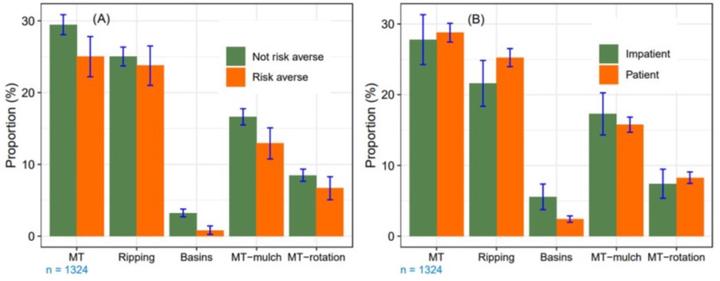Risk aversion, impatience, and adoption of conservation agriculture practices among smallholders in Zambia

Abstract
Sustainable agricultural practices such as conservation agriculture have been promoted in southern Africa for nearly three decades, but their adoption remains low. It is of policy interest to unpack behavioural drivers of adoption to understand why adoption remains lower than anticipated. 0This paper assesses the effects of risk aversion and impatience on the extent and intensity of the adoption of conservation agriculture using panel data collected from 646 households in 2021 and 2022 in Zambia. We find that 12% and 18% of the smallholders were impatient and risk averse, respectively. There are two main empirical findings based on panel data Probit and Tobit models. First, on the extensive margin, being impatient is correlated with a decreased likelihood of adopting combined minimum-tillage (MT) and rotation by 2.9 percentage points and being risk averse is associated with a decreased propensity of adopting combined minimum tillage (MT) and mulching by 3.2 percentage points. Being risk averse is correlated with a decreased chance of adopting basins by 2.8 percentage points. Second, on the intensive margin, impatience and risk aversion are significantly correlated with reduced adoption intensity of basins, ripping, minimum tillage (MT), and combined MT and rotation by 0.02–0.22 ha. These findings imply a need to embed risk management (e.g., through crop yield insurance) in the scaling of sustainable agricultural practices to incentivise adoption. This can help to nudge initial adoption and to protect farmers from yield penalties that are common in experimentation stages."